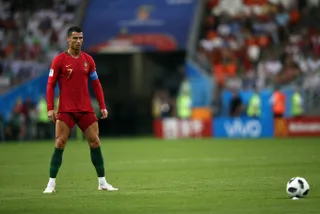
The Cult of the Individual Has Ended
I loved the World Cup.
Initially I thought, maybe because the hype was muted, the political situation with Russia, England’s relatively diminished prospects, football saturation and so on, that the tournament arrived without an excitable bandwagon to jump on.
And then it happened, 3-3 in the second game of the tournament, fantastic goals, star players struggling to shine, controversy, VAR, female pundits smashing through the glass ceiling and while I tried to supress it, the feeling that maybe, just maybe football was coming home…
But now, in the weeks after the end of the tournament, who were the real stars? Who extracted maximum performance in this once-in-a-lifetime opportunity? Who kept their heads when external pressure could have swayed course?
France
Of course, I refer to Didier Deschamps. He is manager of the World Cup winning French football team, who had a number of world renowned stars, yet none dominated to an extent where their personality overtook the team’s identity. There were seven different goal-scorers, none of which were their centre forward. Two years before at the European Championships that the nation had hosted, the team had displayed a fractured team spirit in the final where they lost, but now showed unity and cohesion for all playing and non-playing members of the team
England
I then look at other teams and, at this point, I get to talk about England. A team who on paper had good, but not great players. Where past results didn’t imply any particular chance of success. Manager, Gareth Southgate, was understated and spoke about the collective and common purpose, trying to avoid highlighting individuals or engage in what had become the traditional media build up around the ‘big name’ players.
Portugal
Portugal, with its stand out player Cristiano Ronaldo, who took a starring light for his team (that free kick… at that moment…) yet never seemed to overtake the whole of the team.
Belgium
Belgium, a team of superstars, who were a joy to watch in their Quarter Final against Brazil, were rescued by two bit-part and often ridiculed substitutes in an amazing game against Japan, where the manager desperately changed the focus to haul them back when on the brink of elimination.
Argentina
This was meant to be Messi’s tournament, but whilst the Argentina manager strove to build around ‘the Best Player in the World’, they seemed to struggle and ultimately failed with no real identity.
Brazil
Looking at Brazil and their superstar Neymar, who demanded the attention and focus and tried to live up to it but ultimately is remembered for his theatrics and behaviour. The team was built around him and you wonder whether the other players’ sacrifices hindered the team collective.
Germany
Finally, we look at Germany. Historically they have been the embodiment of a team dynamic, the mountain tops we aspire to reach, and yet they failed to get out of the Group Stage. Somehow, they had lost their identity as a team and what their collective dynamic was, which had driven them in past tournaments.
The Cult of the Individual
In the warm afterglow of the World Cup, which with the unprecedented British heatwave and fantastic football played across the five weeks, I am choosing to attribute these observations to human reaction and evolving perspective.
Football stars are rewarded well beyond their peers and coaches, not to mention the average Joe. The media attention is, of course an occupational hazard, but feeds into a media cult where every selfie taken, facial expression, words spoken, are forensically examined. Pre-game punditry focuses on the select few, not the many.
As top-level football becomes a multi-billion industry and the connection with local fans becomes increasingly distant, are we getting to a place where the cult of the individual, whose selfish ambitions and innate need to be showered with all adulations, is surpassed by an understanding that drawing people together to act and work together doesn’t require a leader who dominates?
The finest leaders draw the best parts together, whether that be the superstars or the team players, and forge an identity fused with a common goal where every part of the team belongs and can celebrate being part of something greater.
Stronger Together
Coming back home to England, what was it that created this warm fuzzy feeling about a team which on paper wasn’t a shadow of the 2004-2010 golden generation? I hope (and I desperately want to believe) that, as we saw the big names drop by the wayside, the realisation came that together we can achieve so much more than when we’re on our own.
So, I take enormous delight in saying that maybe we can look at the World Cup and take pride in the guidance it is has given us in terms of how success can be achieved for all rather than for the individual.
To book, or for more info. on any of our speakers, call us on +44 (0)20 7607 7070 or email us at info@speakerscorner.co.uk .
Newsletter Sign Up
If you liked this article then why not sign up to our newsletters? We promise to send interesting and useful interviews, tips and blogs, plus free event invites too.
Photo credit: Marco Iacobucci EPP / Shutterstock.com 2018
Have an enquiry?
Send us a message online and we'll respond within the hour during business hours. Alternatively, please call us our friendly team of experts on +44 (0) 20 7607 7070.
